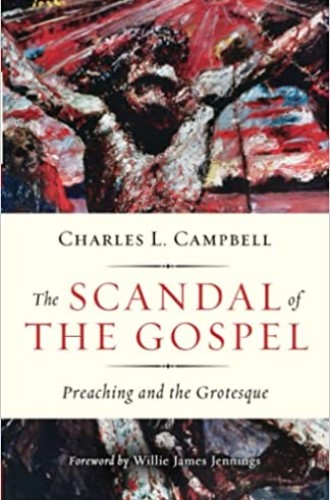The Word made grotesque
If we want our sermons to resemble real life, says Charles Campbell, we might take a hint from carnival.
In the interest of full disclosure, I should begin with a few confessions. One of my favorite hymns is “Fairest Lord Jesus.” For a spell, I included a quote from Fyodor Dostoevsky in my email signature: “Beauty will save the world.” And I’ve long swooned over Eugene Peterson’s glorious rendition of John 1:14: “The Word became flesh and moved into the neighborhood.” Which is all to say that I’m a tough sell for Charles Campbell.
Campbell, professor emeritus of homiletics at Duke Divinity School, asks us to consider not a beautiful savior but a grotesque one. He wants us to resist redemption stories that are lovely but bring about little more than false hope. Rather than inviting us to imagine encountering Jesus on the next block over, Campbell translates John’s critical line in a significantly less charming manner: “The Word became grotesque and dwelt among us.” Still, despite my attachment to an aesthetically pleasing theological imagination, I find Campbell’s slender volume compelling—and even convincing.
The four chapters of The Scandal of the Gospel were originally delivered as the 2018 Lyman Beecher Lectures at Yale Divinity School, and the oral quality of the prose was wisely maintained. Campbell begins by rejecting the preacherly tendency to impose order on chaos. “We seek to discern a pattern, a narrative, a doctrine that will provide some clarity and structure,” he notes. The problem is that these patterns are often artificial; these narratives false. The grotesque, in contrast,
shocks us out of our comfortable patterns, including those that many of us may rely on in the pulpit. And isn’t that what the gospel does as well? Isn’t that deep down the “scandal”—the offense—of the gospel? Piercing the veil of familiarity. Making us aware of the perilous paradoxicality of life. Taking us through the surface of life toward mystery and the unexpected.
Life, Campbell accurately observes, is considerably more complex than a tidy sequence of so many redemption stories. For that matter, the story of Jesus—with the cross at the center—is similarly complex. When so much of the world remains ensconced in the degradations of Good Friday, preachers can seem awfully out of touch doling out sermons that are more grounded in the security of respectability than the hope of resurrection.
Campbell suggests a powerful metaphor for the “grotesque gospel”: the chapel on the campus of the University of Central America in San Salvador, adjacent to the site of the 1989 murders of six Jesuit priests, their housekeeper, and her daughter. When worshipers face the chancel, they behold a series of painted panels memorializing events from the civil war in El Salvador. These cheerfully colored scenes of murder and martyrdom flank an intensely hued cross; Campbell quotes Edgardo Colón-Emeric’s observation that the “symmetry of the figures and the brightness of the colors illustrate the power of the Resurrection to bring order and beauty to the darkest places.”
Meanwhile, the preacher’s view is starkly different: the stations of the cross rendered in brutal detail. The figures in the drawings are being tortured, the expressions on their faces gnarled by unambiguous agony. The effect is shocking. Quoting Colón-Emeric again, Campbell writes:
The pulpit in that chapel in San Salvador sits in a space of unresolved contradictions. One preaches there standing between the beautiful, colorful cross and the graphic, black-and-white images of torture. One preaches “poised between death and rebirth, insanity and discovery, rubble and revelation.” And in that space none of my neat, familiar patterns would do.
Neither does it do, I note from my privileged context, to look the other way.
While I am likely to avert my eyes from the rubble of war, I am tempted to gawk at the depravity of carnival festivities even as I clutch my pearls. Yet Campbell’s theological reconnaissance of this age-old custom of social upheaval reveals that there is much more to witness on carnival night than titillating entertainment:
Like the body of Jesus, carnival enacts the grotesque. It degrades all that is high and lifted up. It brings down the abstract, the idealized, the ethereal and gives them bodily form. It enacts the Word made flesh. It performs incarnation. Accordingly, carnival scandalously celebrates the lower body, with all of its reproductive, digestive, and excretory functions . . . sex, eating and drinking, urinating and defecating. The daily realities of human flesh. Carnival both acknowledges and celebrates our creatureliness—the fleshy, material dimension of human life that piety and manners and pulpits often seek to deny or control.
As he weaves these images together with an analysis of the Magnificat and interpretations of the “leaky, porous body” of Jesus healing the equally leaky and porous body of the hemorrhaging woman in Mark 5, the implications are humbling.
In the final two chapters, Campbell explores the role of the grotesque in the dehumanizing scourge of racism and the universally catastrophic repercussions of the climate crisis. In the former, Campbell addresses the apotheosis of American weaponization of the grotesque, lynching, through the work of James Cone and reframes Harriet Beecher Stowe’s antislavery novel, Uncle Tom’s Cabin, as a deeply imperfect homiletic of empathy. In the latter, he argues that preachers are not addressing the environmental crisis with the urgency it deserves because we have a tendency to press into the false pattern of hope. Campbell notes, “In the context of climate change, hope cannot serve as the nice, neat resolution for Christian preaching.”
Both of these chapters, with their profound social ramifications, are a reminder that the proclamation of the gospel is never divorced from context. The body of Christ is never separate from the bodies that compose it.
I cannot say that I enjoyed this book. But there is no denying the truth it reveals: the Word became grotesque and moved into our neighborhoods, and it does no good to look away.





